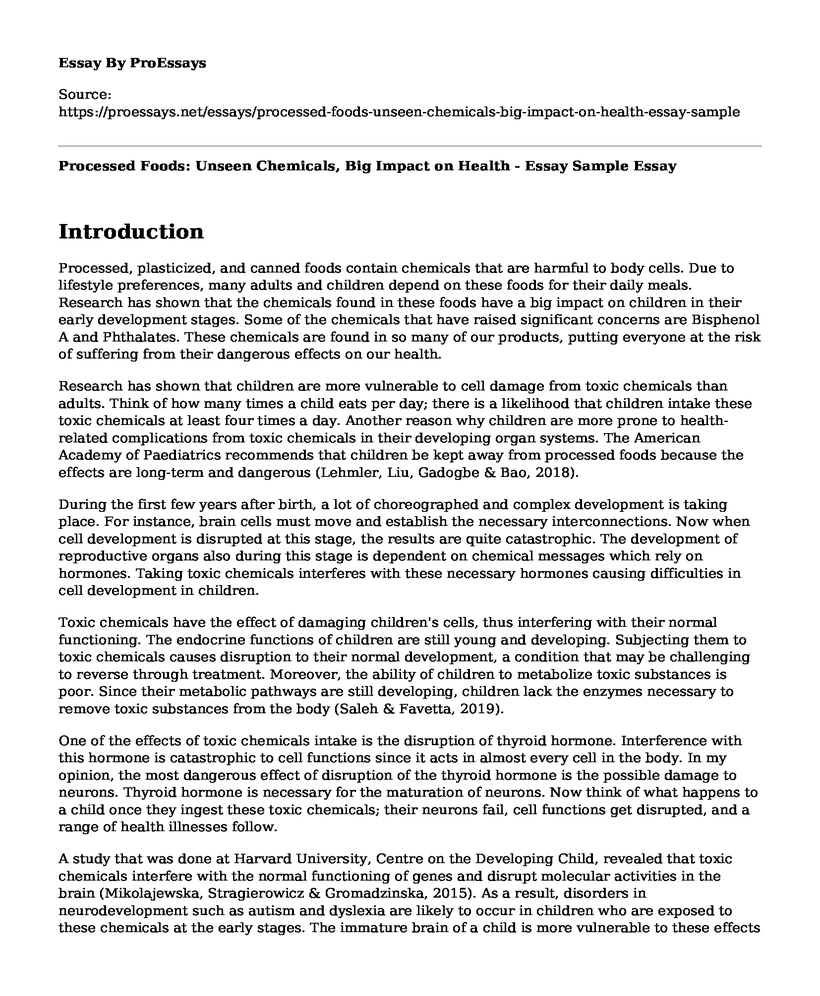Introduction
Processed, plasticized, and canned foods contain chemicals that are harmful to body cells. Due to lifestyle preferences, many adults and children depend on these foods for their daily meals. Research has shown that the chemicals found in these foods have a big impact on children in their early development stages. Some of the chemicals that have raised significant concerns are Bisphenol A and Phthalates. These chemicals are found in so many of our products, putting everyone at the risk of suffering from their dangerous effects on our health.
Research has shown that children are more vulnerable to cell damage from toxic chemicals than adults. Think of how many times a child eats per day; there is a likelihood that children intake these toxic chemicals at least four times a day. Another reason why children are more prone to health-related complications from toxic chemicals in their developing organ systems. The American Academy of Paediatrics recommends that children be kept away from processed foods because the effects are long-term and dangerous (Lehmler, Liu, Gadogbe & Bao, 2018).
During the first few years after birth, a lot of choreographed and complex development is taking place. For instance, brain cells must move and establish the necessary interconnections. Now when cell development is disrupted at this stage, the results are quite catastrophic. The development of reproductive organs also during this stage is dependent on chemical messages which rely on hormones. Taking toxic chemicals interferes with these necessary hormones causing difficulties in cell development in children.
Toxic chemicals have the effect of damaging children's cells, thus interfering with their normal functioning. The endocrine functions of children are still young and developing. Subjecting them to toxic chemicals causes disruption to their normal development, a condition that may be challenging to reverse through treatment. Moreover, the ability of children to metabolize toxic substances is poor. Since their metabolic pathways are still developing, children lack the enzymes necessary to remove toxic substances from the body (Saleh & Favetta, 2019).
One of the effects of toxic chemicals intake is the disruption of thyroid hormone. Interference with this hormone is catastrophic to cell functions since it acts in almost every cell in the body. In my opinion, the most dangerous effect of disruption of the thyroid hormone is the possible damage to neurons. Thyroid hormone is necessary for the maturation of neurons. Now think of what happens to a child once they ingest these toxic chemicals; their neurons fail, cell functions get disrupted, and a range of health illnesses follow.
A study that was done at Harvard University, Centre on the Developing Child, revealed that toxic chemicals interfere with the normal functioning of genes and disrupt molecular activities in the brain (Mikolajewska, Stragierowicz & Gromadzinska, 2015). As a result, disorders in neurodevelopment such as autism and dyslexia are likely to occur in children who are exposed to these chemicals at the early stages. The immature brain of a child is more vulnerable to these effects since it lacks the protective barrier that blocks chemicals from the bloodstream from entering into brain tissues in adults.
Conclusion
In conclusion, toxic chemicals such as bisphenol A have become a major component in processed and canned foods. These toxic chemicals have the capacity to limit proper development in children, not only in the early developmental years, but may also cause life-long impairments. The basic unit of the body; the cell is at a high risk of damage. Once the cells are damaged, organs fail, and the whole body system suffers. While the chemicals are also dangerous to adults, the effects are harder on children due to the sensitivity and poor development of their organs. Essentially, keeping children away from these chemicals is the only way to protect them.
References
Lehmler, H., Liu, B., Gadogbe, M., & Bao, W. (2018). Exposure to Bisphenol A, Bisphenol F, and Bisphenol S in U.S. Adults and Children: The National Health and Nutrition Examination Survey 2013-2014. ACS Omega, 3(6), 6523-6532. doi:10.1021/acsomega.8b00824
Mikolajewska, K., Stragierowicz, J., & Gromadzinska, J. (2015). Bisphenol A - Application, sources of exposure and potential risks in infants, children, and pregnant women. International Journal of Occupational Medicine and Environmental Health. doi:10.13075/ijomeh.1896.00343
Saleh, A., & Favetta, L. (2019). 159 Effect of bisphenol A and bisphenol S on AMH and AMHR mRNA expression during in vitro bovine oocyte maturation and early embryo development. Reproduction, Fertility, and Development, 31(1), 204. doi:10.1071/rdv31n1ab159
Cite this page
Processed Foods: Unseen Chemicals, Big Impact on Health - Essay Sample. (2023, Apr 04). Retrieved from https://proessays.net/essays/processed-foods-unseen-chemicals-big-impact-on-health-essay-sample
If you are the original author of this essay and no longer wish to have it published on the ProEssays website, please click below to request its removal:
- Pharmacology and Diverse Population - Essay Sample
- Strategies For Managing Malware Risks - Paper Example
- King`s Conceptual System Theory Essay Example
- Essay Sample on Hematopoietic Cells and the Immune System
- Paper Example on Protection from Pregnancy Discrimination by OFCCP Rule
- Public Communication: New Technologies, Early Warning Systems and Larger Audience Coverage - Essay Sample
- Free Report Example on 1 in 134 Women at Risk of Cervical Cancer: Get Screened Now







